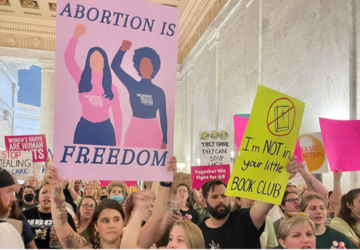
Election Mid-term Update
By Caroline Antonacci
On May 15, the primaries for the Midterm elections for Idaho, Nebraska, Oregon, and Pennsylvania took place. In Pennsylvania, all senators, 18 House representatives, and five statewide elected officials are male. That is likely to change. A record number of women ran for House seats as there were at least seven Democratic women. Madeleine Dean, Chrissy Houlahan, and Mary Gay Scanlon all won in Philadelphia suburban districts and are favored to win in November. This could mean that they could break the state’s all-male congressional delegation. Susan Wild won in the Lehigh Valley against John Morganelli and faces a tough match in the general election race. In Nebraska, Jane Raybould won for the Democrats for US Senate, and Deb Fischer won for the Republican primary. In Idaho, Paulette Jordan won the Democratic Primary for Governor. She will face Brad Little in the general elections. Kate Brown will face GOP state Rep. Knute Buehler in the general election in Oregon.

Stacey Abrams Makes History Winning Georgia Democratic Primary for Governor
By Lexi Stein
On Tuesday, May 22nd, 2018, Stacey Abrams was chosen to be the first black woman nominee for Governor in the United States, representing Democrats of Georgia. Abrams who was formerly a State House leader, defeated Stacey Evans, another former state legislator. Abrams is motivated and ready to move on to bigger accomplishments, recognizing that the state’s traditional and conservative views are beginning to shift. Abrams is not moping about our history, she is bettering our future. Being the South, nominating a Black woman was a huge moment for Georgia’s history. The general election is sure to draw intense national attention as Georgia voters determine whether a Black woman can win in the Deep South, a region that has not had an African American governor since the Civil War. All in all, no matter whether Abrams is elected as a state governor or not, Abrams has made great leaps so far, defying gender and prejudice labels of an “ideal candidate”.

Iowa’s New Abortion Law
By Sarah Guest
The American Civil Liberties Union, Planned Parenthood and the Emma Goldman Clinic of Iowa City are suing to block the new Iowa state law known as the “fetal heartbeat” law. This new law which bans the abortion procedure after a fetal heartbeat is detected at around the six-week mark and is the strictest abortion limit in the United States, was scheduled to take effect on July 1st. An Iowa judge has granted a temporary injunction on the law until the lawsuit goes forward. The lawyers for the state of Iowa agreed to the injunction.
The six-week mark is before many women are even aware of their pregnancy, and essentially leads women who realize they are pregnant after the six-week mark to be in a situation where the decision to have a child is no longer in their hands. Women who are either not ready to have a baby or feel that they are not in an appropriate position will have no say in the decision. While the law appears fair to some, for many women unaware of their pregnancy, the law completely removes the choice they would be able to make. Some sponsors of the law anticipated this lawsuit in the hopes that it would trigger a challenge to the 1973 Supreme Court Roe v. Wade decision which established a woman’s constitutional right to an abortion. These lawmakers hope that the conservative majority of the current Supreme Court justices will reverse Roe v. Wade.
In a survey, seven women shared how long it took them to realize they were pregnant. The time period ranged from four to twelve weeks. For women who suffer from oligomenorrhea, the medical term describing menstrual periods that are irregular or infrequent, it might not seem out of the ordinary that their period is late, leading the women to assume its lateness is related to their menstrual irregularity, not pregnancy. Under this set of circumstances, women could be six weeks pregnant and not know it.
Suzanna de Baca, the president of Planned Parenthood of the Heartland, said at a news conference, “Iowa will not go back in time by taking away this right. Planned Parenthood is challenging this law because the Iowa Constitution is clear a woman has a right to access a safe and legal abortion.” However, while women are still technically able to get abortions, because of the six-week timeframe, for many women their right to get an abortion is stripped away.







